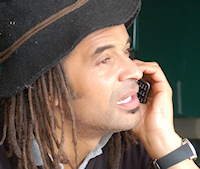
Part 1 of my interview with Arthur Ashe’s protégé, the only tennis player with dreadlocks who ever won a grand slam. He doesn’t only talk about his new CD and how Obama inspired him but also why he started locs, what his hair, his family and tennis mean to him and where gets his spirituality comes from.
About his locs
How, when and why did started dreadlocks?
YANNICK NOAH: You know, I had this mini-afro before starting my locs. I went to this cousin of mine in Paris and ask her for braids when we were going to my sister’s wedding. Mainly as a joke for me and she does these fake dreads for me. Fake braids, you know, plastic.
So, we went to the wedding but then I didn’t realize that it takes such a long time to remove braids. The next day I had to play the semi-final of the Davis Cup. So, I thought okay, we’ll see when I get there. When I got there I had to practice. So there was no time to take out the braids.
The next thing you know, two days later, people wrote, “Oh, Yannick is like trying to get back to his African roots.”
They had a whole super deep explanation about my braids, while it just started like more of a joke for me.
So, I’m like, that’s cool. You know, all of the sudden, this whole thing about my hair. I found that quite interesting.
So, I went to a shop to get a Rasta head band and a Bob Marley wrist band, you know
because I thought it was funny. Of course, I was listening to Bob Marley.
When we won the game people said, “Yeah, yeah, Yannick is into his roots, his African roots”. It wasn’t really true, but I went with it. I thought, now I need to grow the real thing.
MIREILLE: So, that’s how it started?
YANNICK NOAH: Yeah, I removed the braids, and underneath I just started to let it grow. This is what happened. And actually when I won the French Open, it was not real hair. I had braids.
New York or Paris? How long have you been in New York?
YANNICK NOAH: On and off, about 12 years. You know, I spent 2 years here, then went back for 1 year.
Do you like New York better than Paris?
YANNICK NOAH: Well, my life is so different here, you know. It’s like anonymous. Walking around freely, going to a bar. I can go to a bar by myself. When I’m in Paris, everybody knows me, so it’s totally different. It’s a whole different life. Everybody knows me. Everybody.

Of course, you are a hero. The last French man to win Roland Garros, the French Open after 37 years and winning the Davis Cup. That’s incredible Many people were named after you, too, you know.
YANNICK NOAH: Yeah. So, I like to go there to Paris and work. For every day life, I like New York. It’s anonymous.
About his Music

What inspired this new cd? You have cd’s that were inspired on Nepal, Africa and South America. Was it Chile or Bolivia?
YANNICK NOAH: It was Chile. The Charrango a Bolivian instrument? It is everywhere in Chile. But what we wanted to do was to take the same road that Che Guevara took right after he got his diploma.
He took his motorcycle with his friend to check out life. He, Che Guevara was from a wealthy family in Santiago, goes to school, in a wealthy neighborhood to become a doctor. Before he starts working he says, “Listen, I want to see the world for one year.”
So, he takes off with his best friend. This is a true story. He goes with his best friend on this old motorcycle. They just go and get out of Santiago. They end up, like, in this place up north in Chili where all of a sudden, he finds himself thorn between following the path that was laid out for him or actually breaking that and going to help poor people. More like laborers. People warn him that it’s dangerous. So, what do you do?
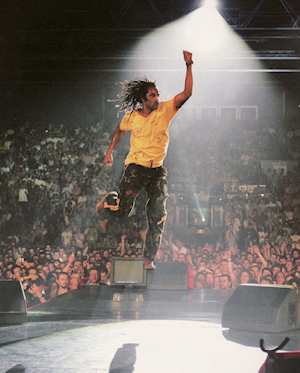
So, anyway, something happened during that trip, where he realized that basically, he doesn’t want to follow that path that was laid out for him. I like that. Sure that is an inspiration for me. There’s a movie made based on his trip “the Motorcycle diaries. It’s a beautiful movie. They show all the places that Che went to and we actually went to.
His story is so inspirational to me because he was trying to help, you know. Trying to help the poor people. That is inspiring. That is great.
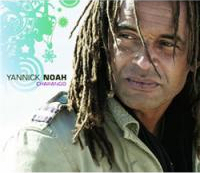 What was your experience like there up north in Chili?
What was your experience like there up north in Chili?
YANNICK NOAH: Fantastic! You have these places where you know all of the sudden you feel so … when nature is just so overwhelming that it’s a spiritual experience. You feel small. And you just look. And you just breathe.
There’s a connection there that is so natural. It just happens right there right ten. If you want to be spiritual here in the city, it is an effort. You have work on something within. You have to work for it. …but, when you you see nature like Atacama Dessert, that’s where it was, spirituality just happens to you. That is what the place is like.
There are volcanoes. So it can be like minus 15 Celsius, and then all of the sudden after the sun rises within 10 minutes, its 20 degrees. So, if I have the opportunity to take people on some kind of trip with my music, I like there to be an experience within the music within the story. A deeper connection. An experience that I can relate to, for real.
The connection, out of Love
Actually, that is how I started to begin with. As the son of a white mother and a black father it was natural for me to tell the story of my connection with white and black and my African roots. That was so natural. That is my history from the day I was born. That is obviously the story I shared first. I come from a place of love you know. So I wanted to share it because the story is a beautiful story and because I think gives a lot of hope. Then, once I did that I was off to the next step.
I had to find myself when it came to religion. I was raised Catholic but my mom the most generous person I know, wasn’t a believer.
So I had to create my own thing, and my own thing was pretty much inspired by Buddhism, which basically mixes everything. You know, you can do your own thing. It’s very tolerant.

More spiritual than a religion?
YANNICK NOAH: Yeah, you can have quotes from anywhere. So, I liked that and started to read books. I started to meet other Buddhist people, go to meetings and really got into it. I did yoga every day. I met with the Dalai Lama.
You met the Dalai Lama?
YANNICK NOAH: Yeah.
How was that?
YANNICK NOAH: Oh, that was amazing. That was amazing! He is like beyond. That was so great. I was following this master Sogyal Rinpoche who wrote several books to make Buddhism known in the Western World.
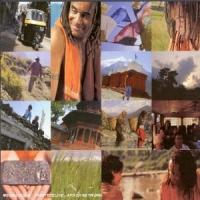 Anyway, so I used to go to lectures and so on and so forth. Then, I wanted to go to there. I wanted to see Tibet. I wanted to go to Nepal. I wanted…I went there a few times walking with my backpack, and felt it. So, the my 2nd CD was based on this whole experience.
Anyway, so I used to go to lectures and so on and so forth. Then, I wanted to go to there. I wanted to see Tibet. I wanted to go to Nepal. I wanted…I went there a few times walking with my backpack, and felt it. So, the my 2nd CD was based on this whole experience.
What did you feel?
YANNICK NOAH: Well, I mean, same thing. Like this city in the Himalaya, you see poor people. And there is just this …thing you know.
How come they are the one giving you the smile? Where’s it coming from? How come these people give you this smile? How come they are like so together? How come? What is it about them? What is it that they have that I look for? What is it?
You know, they are very spiritual people. Spiritual people. And again, the place, the place itself is just so beautiful. That was Pokama. There were monks everywhere.
President Barack Obama And your new CD, what was your inspiration for this one?
YANNICK NOAH: It’s New York! Yeah, it’s New York.
It’s more of a reality, this raw reality. And you know, I have fans. They know I’m in New York. And, I mean, hey – it’s fantastic year to be in America.
Such a fantastic time to be in America. It was such a fantastic… experience to follow this unfolding of history, and be here, hear it, live it.
You mean the 2008 election? Did you believe that the candidate Obama could win from the start?
YANNICK NOAH: No, I didn’t believe at all. I didn’t want to believe it. I didn’t want to be disappointed. I didn’t want to – you know what I’m saying. It’s like, I wanted it too much, you know. I wanted so much.
He seemed like a perfect candidate, everything about him was so natural, so real. It seemed like it was meant to be. So the disappointment would have been too much that I just didn’t want to believe it. I didn’t even want to discuss it.
So when did you start believing he could win?
YANNICK NOAH: I believed it when he was elected. You know, I believed it when he was elected. You remember it was that day people started to talk about this Bradley effect thing.
You mean when voters tend to tell pollsters that they are likely to vote for a black candidate, and yet, on election day, they vote for the white opponent?Y
ANNICK NOAH: Yeah.
So what did the election of President Barack Obama meant to you? It mattered a lot to you if you couldn’t talk about it.
YANNICK NOAH: It means a lot. It obviously means so much. There is like such, so many things, some things are needless to say.
I was here with my friends when he got elected, you know. And we didn’t say much. We just screamed and cried.
What is it that you can say? And cried?
YANNICK NOAH: You know, words were not enough…you know. I mean, we are in this world and like so messed up in so many ways. Just not many reasons to hope really if you look at it on a big scale.
Then this news, that Barack Obama wins. So as human beings we can hope. And that’s what it was.
You know, this is why it was celebrated in a way beyond America. Because people did the right thing. Because finally it seemed that we here in America, actually voted for the good person, the intelligent person. The intelligent, right person won. It is not always the cheater. It is not always the guy with too much money, or more money that wins.
It is not the guy who bribed. It’s the best one, and the world could see it because he was like so…For me, it was not even a race, you know. For me, I was even insulted that they were actually like thinking about it, because it was like so obvious. It was like a big champion against someone who was just there.
How do you think the President is doing? Do you think he deserved the Nobel peace prize in November?
YANNICK NOAH: He sure deserved it. Because of what he did, you know. What he did is like beyond being elected. I don’t know what to say. Obviously, I’m a big fan, you know. But, I mean, people don’t realize, that there are things that you cannot put into numbers.
There are things that you cannot even explain to a certain degree. Like you know, when you give pride, he gave pride to people outside of this country just because of who he is. People that he will never meet in his life.
People that on that very day that he was elected walked with a different swag. This is huge. This is just huge. I trust the guy. I know I trust him. And I’m not someone who trusts very easily. But I trust him.
YANNICK NOAH: Because he’s trying, he’s trying. And, he’s trying for me. I know he’s trying for me. And I’m glad that there is someone out there trying for me, and for us, and for little people. Because I consider myself a little person, and I know that there is someone out there who is trying for us. That is enough.
And he’s not going to succeed in everything, but I mean look at his healthcare. This is the first thing he did for the little people. And it doesn’t happen like that. It is easier to say, “Well, let’s do that tomorrow we got the war. Let’s go kill people.” That you can do in 2 minutes. But like to organize health care is a long process, and people were very patient with him because the degree of hope was so high.
So, Obama really a big inspiration for you?
YANNICK NOAH: Oh, yeah. Yeah.
I mean. I mean, god, like the title of his book, “The Audacity of Hope.” Yes, he’s an inspiration. You know, like nowadays, people in power, they want to separate people.
You mean divide and conquer?
YANNICK NOAH: Yeah and I always felt in the middle because I was always between the fight of the black and the whites. I’m always in the middle.
Did you read his biography? Did you connect with him when you read that?
YANNICK NOAH: Of course. I mean, you know there was going to be a connection. The connection is right there from the very beginning.
I went to school in Calhoun, Cameroun. I’m, like, called café au latte, coffee with milk. So, I’m not part of it. I’m part of them, but not really. I’m not really black enough. I go to France, and oh I’m too black.
MIREILLE: You’re not black enough. I hated that phrase.
YANNICK NOAH: I’m too black. I’m not white enough. And there you sit in the middle. And all of the sudden, there is Barack saying yeah, you know, it’s not that bad. It’s cool. He makes us proud.
And then you go, oh you know what, people say he is not that black and people say he’s not that white. So, you know, he tried to tell them, “Listen, maybe it doesn’t really matter.” So, I’m not going to talk about it, but I’m going to just act like…with my head up, and show you that this is me. And, now, in France, I became like some symbol. I never like really pushed the black and white issue because it doesn’t really matter. I think my actions should speak for me.
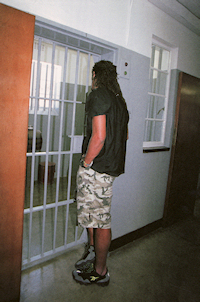
Interesting, but still, what’s interesting to me is that you are obviously both, and why do you have to choose? I feel nobody should have to choose between his mother’s or his father’s race. But, obviously, when you’re in 2 worlds, you do feel a connection with the black players, even when they’re not from Africa, you know. There always seems to be this connection.
YANNICK NOAH: Yeah, because there’s a status. You know, it’s about how people look at you at the end. You know, you feel, and you can be so strong, but there is also the environment at work. And, yes, I tell you the truth, when I was in school, like I went to boarding school in France and tennis school. It was 800 kids living in this school, and I was the only person of color. So, obviously, they send me the vibration of the “you are different.” And, “you are black.” But it’s natural, right?
And there’s some positives and there’s some negatives. But when I was in Cameroon in high school growing up, we were actually in Yaoundé the first mixed family.
Oh, really, yeah?
YANNICK NOAH: The first, 1960. This is the capital of Cameroun, yet we were was the first generation. So, people look at you different. So, the vibe was, different than here, good and bad, you know.
I was used to this soccer world which is all black people, wherever it is. Then, when I awas going to go to tennis world and I am the only black player. One, only one player. And actually, the reason I was there was because some other black guy, Arthur Ashe, who happened to come to Cameroon and helped me to live my dream. If it wasn’t for him, I wouldn’t be here today. So, there are all of these connections. Yeah, definitely. And sometimes, instead of choosing, people choose for you, that’s my answer really.
Yes, that’s true. They try to at least.
YANNICK NOAH: Sometimes it could be natural and sometimes it’s not. But, you know, in the end you need to think about it because sometimes, you are just different. If you walk into a room of twenty white person, of course, you are going to look different.
And you are probably going to get some kind of attention. Same thing when I travel. And I travel a lot, obviously. Whether it’s Asia, Jackson Hole, Wyoming or Johannesburg in 1975 – there’s always the way people look at you while you are still the same person.
You are still the same person, but like the world around you changes. And the way the people look at you, and the experience, you have, changes.
Apartheid Have you ever been kicked out or discriminated against?
YANNICK NOAH: Of course, I was in Johannesburg many times before the end of the apartheid.
MIREILLE: Oh, you have?
YANNICK NOAH: Yeah, used to play there. I played there, and you know, play. I had special authorization to stay with the French team. But the only way I could stay in the same hotel was if the police guy would sleep in front of my door at the hotel.
Twenty-four hours a day being with me all the time. Make sure I’m not creating problems. I played in a stadium where it was like almost empty because white people wouldn’t come and see my games.
In a stadium of I don’t know say 6000 there would be like a little fenced corner for maybe 100 people. And that little fenced corner were like maybe 300 black people rooting for me. Like in a corner of the whole stadium.
And the rest was empty?
YANNICK NOAH: And the rest was mostly empty like 3 or 4 people.
Wow. How did it affect you?
YANNICK NOAH: It makes you sensitive. It makes you sensitive. You know. And then you go back to your values. You go to, you know, your basic right to be here.
Certain lessons that I learned from my parents, you know, to whatever happens you come from love first of all, so don’t let anybody question that. This is you. And you’re beautiful. And you’re good, and you can be the best and just go for it. And just keep your head high whatever. My grandfather used to say that: “just always keep your head high.”
Yannick’s new CD Frontières is out now. you can order it from
amazon.com or via his website: http://www.yannicknoah.com
————————–
Click here to read part 2: His meeting with Arthur Ashe and what he meant to Yannick, a little boy from Africa.




